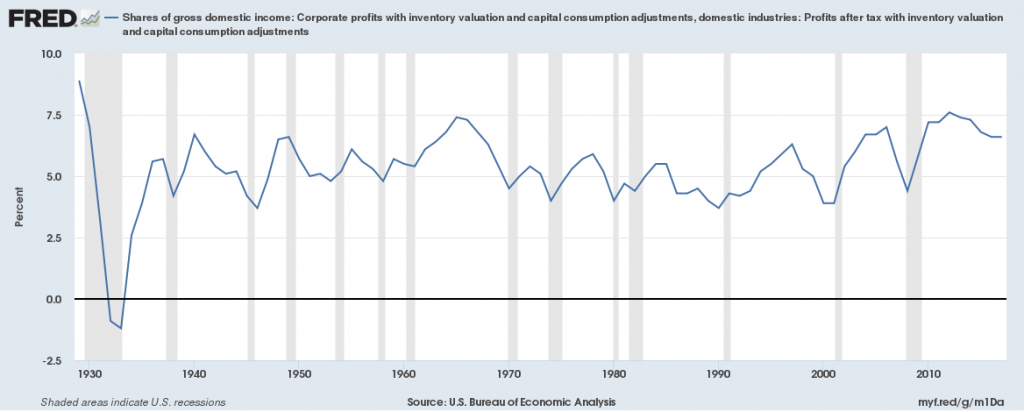Tim Wu, a Columbia University law professor, has an intriguing opinion article in the Sunday New York Times about the link between big business and fascism. He makes the case that a lack of anti-trust enforcement has contributed to the rise of populism around the world. I don’t know if I’d go so far as to call today’s political environment fascism but populism does seem a logical response to the issue of inequality. And inequality, to some degree, springs from the bigness argument.
I do agree too that there is something fundamentally wrong with capitalism as it is practiced here in the 21st century. Corporate profit margins have been on the rise, with the exception of the recessions in 2000 and 2008, since the early 90s and today stand basically at all time highs. Now, one might argue that margins were too low at the beginning of that period but corporate profits today are higher than they’ve ever been no matter how you measure such things (% of GDP, % of national income, profit margins, etc.).
At least from a theory standpoint, high profit margins should not persist and certainly shouldn’t rise relentlessly for nearly three decades. High profits attract new entrants, competition, and should not persist unless there is something preventing new companies from competing effectively. What might cause a reduction in competition? Lots of things actually. Excessive regulation leaps to mind. Incumbent firms love lots of regulations; it makes it that much harder for smaller players to compete. That’s why JP Morgan and the other large banks loved Dodd-Frank. And Dodd-Frank is a major reason concentration in the banking industry has gotten worse since the great financial crisis of 2008. Not exactly a repudiation of “too big to fail”.
There is also what has become known as crony capitalism which is much more akin to fascism and really what this article points to as a cause of our problems. Large companies are able to organize themselves and lobby to influence public policy. Mergers that logically should be blocked on anti-competitive grounds somehow find a way to get approved when the right palms have been greased (campaign contributions) or the right ego stroked. The result is that almost every industry is more concentrated today than it was 30 or 40 years ago.
I am not generally a fan of government intervention but there are times when it is necessary and this may well be one of those times. But we should be careful not to over react. It may be that this is just part of the natural ebb and flow of the economy. It may be too that the cure is worse than the disease. Corporate profits as a % of gross domestic income are now near highs last seen in the mid-1960s. I don’t know that anything was overtly done to reduce margins but they were obviously much lower from 1970 to 1990. If the price of reducing corporate profit margins is a return to the stagflationary 70s, I think I’ll pass. Careful what you wish for I guess:

Here’s the NYT article:
In the aftermath of the Second World War, an urgent question presented itself: How can we prevent the rise of fascism from happening again? If over the years that question became one of mostly historical interest, it has again become pressing, with the growing success of populist, nationalist and even neofascist movements all around the world.
Common answers to the question stress the importance of a free press, the rule of law, stable government, robust civic institutions and common decency. But as undoubtedly important as these factors are, we too often overlook something else: the threat to democracy posed by monopoly and excessive corporate concentration — what the Supreme Court justice Louis Brandeis called the “curse of bigness.” We must not forget the economic origins of fascism, lest we risk repeating the most calamitous error of the 20th century.




Excellent analysis. I share your skepticism of government intervention, but corporations are government sanctioned institutions in the first place, not pure creations of a free market. Government sets the rules under which they are chartered, governed and financed. So more than free market principles are already involved and government intervention is only a question of what kind and how much.
Maybe antitrust enforcement has been too lax. But there also may be other issues, such as tax laws. For instance the tax code may incentivize the accumulation of capital within the corporate structure as opposed to its distribution to stockholders in the form of dividends. Monetary policy calculated to create a “wealth effect” may make capital artificially cheap to corporations. Maybe the same principle of progressivity should be applied to corporations as individuals, where the bigger the corporation, the higher the tax rate.
In any case, the first place to look is for ways in which government intervention may be helping to create the problem.